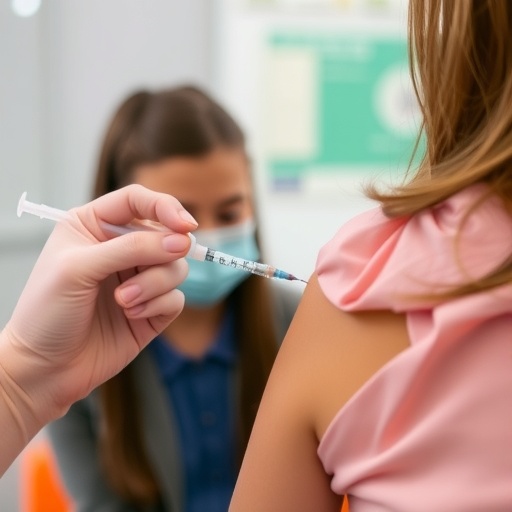A groundbreaking study published in the journal Vaccine reveals compelling evidence that COVID-19 vaccination in adolescents significantly diminishes the risk of developing long COVID following their initial SARS-CoV-2 infection. Conducted under the aegis of the NIH-funded RECOVER Initiative, this research brings new clarity to the benefits of COVID vaccination in young populations, extending the narrative beyond the well-documented reduction in acute illness severity. This comprehensive analysis provides the first robust data that support vaccination as a crucial preventative measure against the chronic sequelae of COVID-19 in adolescents.
Long COVID, a condition marked by persistent symptoms such as debilitating fatigue, musculoskeletal pain, and cognitive impairments, has posed a substantial health challenge since the onset of the pandemic. The RECOVER research team estimates that approximately 5.8 million youths in the United States have endured these prolonged symptoms, which interfere significantly with daily activities and quality of life. Despite ongoing efforts to combat SARS-CoV-2 transmission, the prevention of long-term post-infectious complications remains a pivotal concern for pediatric healthcare providers and public health officials alike.
Prior investigations have established that vaccination against COVID-19 reduces the risk of long COVID in adult populations. However, there has been a notable paucity of data regarding this protective effect in adolescents. Addressing this crucial gap, the new study enrolled over 1,200 adolescent participants from diverse geographic locations across the United States. Among the cohort, 724 adolescents had received COVID-19 vaccination within the six months preceding their documented first infection, while 507 remained unvaccinated during this period, providing a well-defined comparative analysis group.
The research findings are compelling: unvaccinated adolescents exhibited a long COVID incidence exceeding 20%, whereas vaccinated peers showed a marked decrease to approximately 13%. This difference corresponds to a striking 36% reduction in the risk of developing long COVID symptoms attributed to prior vaccination. Such statistically significant outcomes reinforce the view that immunization confers durable benefits that extend into the post-infection recovery phase, thereby mitigating the long-term health burden posed by SARS-CoV-2.
Notably, the study employs rigorous epidemiological methods, incorporating detailed clinical assessments and robust longitudinal follow-up to ascertain the persistence and nature of post-COVID symptoms. Investigators monitored a broad symptom spectrum, including fatigue intensity, musculoskeletal discomfort, and neurocognitive function, to holistically evaluate the vaccine’s preventive efficacy. This nuanced approach provides a granular understanding of how immunologic priming through vaccination diminishes chronic symptomatology.
According to Dr. Melissa Stockwell, chief of the Division of Child and Adolescent Health at Columbia University and the study’s clinical senior author, the findings underscore the importance of COVID-19 vaccination programs not only as a tool for preventing acute infection but also for reducing the risk of protracted symptomatology that impairs adolescent wellbeing. “Our study highlights a critical secondary benefit of vaccination that could enable many young individuals to resume normal activities post-COVID,” she asserts, emphasizing the public health implications of widespread vaccine uptake among adolescents.
The study also addresses the urgent need to understand COVID vaccination’s impact on subsequent viral exposures. While current data focus primarily on first-time infections, the research team advocates for continued surveillance and investigation into vaccine performance amid repeated SARS-CoV-2 encounters, especially considering the emergence of variant strains with altered transmissibility and immune escape mechanisms.
A consortium of leading academic institutions collaborated on this study, including Harvard University, NYU Langone, University of California San Diego, Rutgers University, University of Tennessee, Virginia Commonwealth University, and the University of Southern California, among others. This multi-institutional partnership underscores the multidisciplinary nature of the RECOVER Initiative, which integrates expertise across pediatrics, epidemiology, immunology, and patient advocacy to address the complex challenges posed by long COVID.
The study’s robust funding from NIH agreements OT2HL161841, OT2HL161847, and OT2HL156812 facilitated comprehensive data collection and analysis, incorporating advanced bioinformatics and patient-reported outcomes frameworks. This strategic investment has yielded critical insights directly informing clinical guidelines and public health policies pertinent to adolescent populations globally.
By clarifying the secondary preventative effect of COVID-19 vaccination, this research paves the way for renewed advocacy campaigns aimed at increasing vaccine coverage among youths. The data resonate strongly with parents, educators, and clinicians who grapple with the far-reaching impact of long COVID on educational attainment, mental health, and future developmental trajectories. Such evidence empowers stakeholders to strategically promote vaccination as a vital component of holistic adolescent health safeguarding.
As the pandemic evolves, this landmark study enriches the scientific community’s understanding of vaccine-mediated protection layers. It invites further ancillary research into immunological mechanisms underpinning long COVID mitigation and interrogates potential variations in vaccine efficacy based on timing, dosage, and viral variants. Ultimately, the findings coalesce into a hopeful narrative advocating vaccination not only as an immediate disease control strategy but also as a critical shield against the lingering shadows cast by SARS-CoV-2 infections in young lives.
Subject of Research: People
Article Title: Preventive Effect of Vaccination on Long COVID in Adolescents with SARS-CoV-2 Infection
News Publication Date: Nov. 6, 2025
Web References: https://doi.org/10.1016/j.vaccine.2025.127907
Keywords: Long Covid, Vaccination, COVID-19, Adolescents, SARS-CoV-2, Pediatric Health, Post-Acute Sequelae, Immunization, Public Health, RECOVER Initiative




